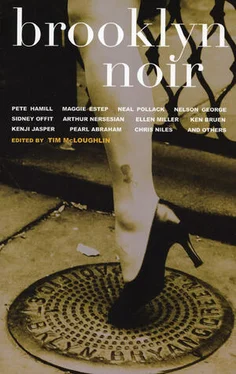It was my turn to walk the streets and think.
The perpetrators had used public opinion to help make their case to the judges. I too would have to take my case to the public. And since I couldn’t afford print — even the cheapest pamphlet costs a goodly sum — I would have to use the poor man’s version: the Internet.
At my desk the next morning I found a chat room with organized religion as its topic, soon steered the conversation to religious politics, and posted my story as an example of corruption, proclaiming the Dobrover’s innocence. I didn’t have to wait long for the important questions to come up, the who and why of every whodunit, and I pointed my finger to the brother-in-law as prime perp, offered as explanation the oldest motivation, envy, the reason Cain raised his hand against his brother Abel. I was convinced and was able to convince others that without the green worm of jealousy, the Dobrover rebbe and his family would have remained untouched.
Consider this brother-in-law: a promising yeshiva boy who in maturity proved to be a minor scholar with an impatient mind incapable of complex argument. Marrying the sister of the Dobrover rebbetzin, herself a woman of fine rabbinical stock, was his undoing. He would have sat at the table, listened to the deeply scholarly talk, and squirmed in ignorance. The first years of his marriage, he sat pressing the yeshiva bench unwillingly, because the husband of the Dobrover’s rebbetzin’s sister had to be a scholar, then seized the first opportunity that came his way and became the director of the newly founded Szebeder boys’ school. The position fulfilled his need to move about and accomplish things, but at the Sabbath table the sense of his own inferiority would have deepened. And without scholarship to occupy his mind, he became a plotting busybody. The rivalry between the two congregations presented him with an opportunity. Knowing he would never be a significant player in Dobrov, he determined to curry favor at Szebed. Indeed, his reward for interfering in the life and marriage of Dobrov was proof enough of his motivation: He had recently been appointed administrative overseer of the entire Szebed congregation, not a scholarly position, but respectable enough to protect him from his detractors. In taking him on, in other words, I was taking on the whole of Szebed. The anonymity of the Internet, I hoped — I hadn’t used my name — would protect me.
And that’s where I miscalculated. I didn’t count on the Internet’s long and wide reach, nor its speed. Religious corruption, whether among priests or rabbis, has a captive audience in America. Well-meaning, sympathy-riddled letters came pouring in, as if I was the one who had suffered the heavy hand of the court. The chat room conversations went on for hours and days, and when I was too exhausted, continued without me, spilled over into new chat rooms. I spent hours online, returned to my office after services and dinner, and remained until midnight typing.
Who were the people chatting? A mixed group — the word crowd would be more correct — it turned out. There were both knowing and unknowing participants, meaning Hasidic and not. Also a good number who asked questions that revealed they knew nothing at all about Judaism. Within days, a reporter from the Village Voice asked for an interview, then a staff writer writing for the New Yorker’s “Talk of the Town.” I agreed to give the interviews as long as I remained anonymous. I didn’t meet them in person.
Is it necessary to say that I wasn’t making my wife happy? She argued that I would remain anonymous only to outsiders. Anyone on the inside who wanted to know who was behind this would soon figure it out. Once known, my name would be mud, and our lives would be shattered. And of course she had a point. Good women are often prescient.
First an anonymous threat to cease and desist or suffer consequences was posted in what I was by now thinking of as my chat room, named Hasidic Noir by a participant, a wise-guy. I was accused of lying. Where were the mourners? this faceless voice asked. No one had performed keria (the ripping of the lapels), no one was sitting shiva (seven days of mourning), and no one had recited the mourner’s kaddish (the prayer for the soul of the dead). He concluded with a declaration that there was no Dobrover rebbe or Dobrover congregation, that I was a careerist who had fabricated a murder for the sake of publicity.
Clearly this was coming from an insider with knowledge of the vocabulary and customs, someone who knew that excommunication rendered a man nonexistent to the community, hence his argument that there was no Dobrover rebbe.
The chat room became a divisive hive, with people taking sides, demanding to know what the words meant, who was the liar in this story, how to find out. One cynical participant raised the irrelevant question of my, not the murderer’s, motivation. If the brother-in-law is jealous Cain, he asked, who is this snitch, and what’s he going for? The next morning the Village Voice published the interview, and late that evening, when my wife and I were already in bed, there was a knock at the door.
I drew on my flannel dressing gown, removed the Glock I keep in the locked drawer of our night table, and instructed my wife to remain in bed. I opened the door, loaded gun in hand, pointing. These men should know what there is to know. Three Szebeder bums stood red-faced, mouths open, breathing hard. They must have used the stairs. If you didn’t know better, you’d think they’d been imbibing. But I knew that if there’d been any excess, it had been verbal not alcoholic. To achieve a tough’s appearance they’d had to talk themselves into a frenzy.
The barrel end of the gun quickly quieted them, as it often does those who want to live. The middle one in the group produced a letter. I opened it in front of them, keeping the gun aimed, keeping them fearful and rooted in place. At a glance, the letter appeared to be a court summons. The Jewish court, made up of the same rabbis who’d helped bury the Dobrover, was now calling me in.
I congratulated myself on achieving something of a goal. Two weeks ago these men wouldn’t have given me the time of day. Now they were all ears. But if I didn’t want to lose all that was precious to me — my wife, my children, and my livelihood — I would have to plan well. I would tell my story, but I would tell it publicly.
I looked at the quivering men at my door and felt sorry for them, mere messengers. We were told to bring you in, one mumbled.
Tell the court I’ll see them tomorrow, at 9 a.m. sharp, in the revealing light of day. There will be no nighttime shenanigans. Good evening.
I shut the door and waited for the sounds of their steps, first shuffling, then sprinting to get away. I bolted the door, inserted the police lock, looked in on the children who had slept through it all, assured my wife that everything was under control, and got to work on the small laptop I keep at home.
When I finally returned to bed at 3 in the morning, my wife hugged me silently and did her best to remind me that I am only a man, of flesh and blood, not iron. I knew that even though she was against what I was doing — for reasons of safety rather than principle — she couldn’t help but be proud of the way I was handling it.
I slept well, and in the morning dressed as usual, in my charcoal gray suit, white shirt, black overcoat, and silk muffler. I pocketed the Glock as protection against the court’s manhandling, their method of intimidation. This was a non-jurisdictional court, therefore without metal detectors, and without the routine of body searches, both unnecessary. A handful of appointed rabbis, intrinsically honest, would act as judges, but they owed their livelihoods to their patrons, the men who nominated, appointed, and paid for their services. There would be some younger scholars available to act as mediators. Also present would be the man who was bringing the case against me. Who would it be? I expected to see the man I’d fingered, the jealous brother-in-law, or if he didn’t want to show his face, a representative.
Читать дальше












